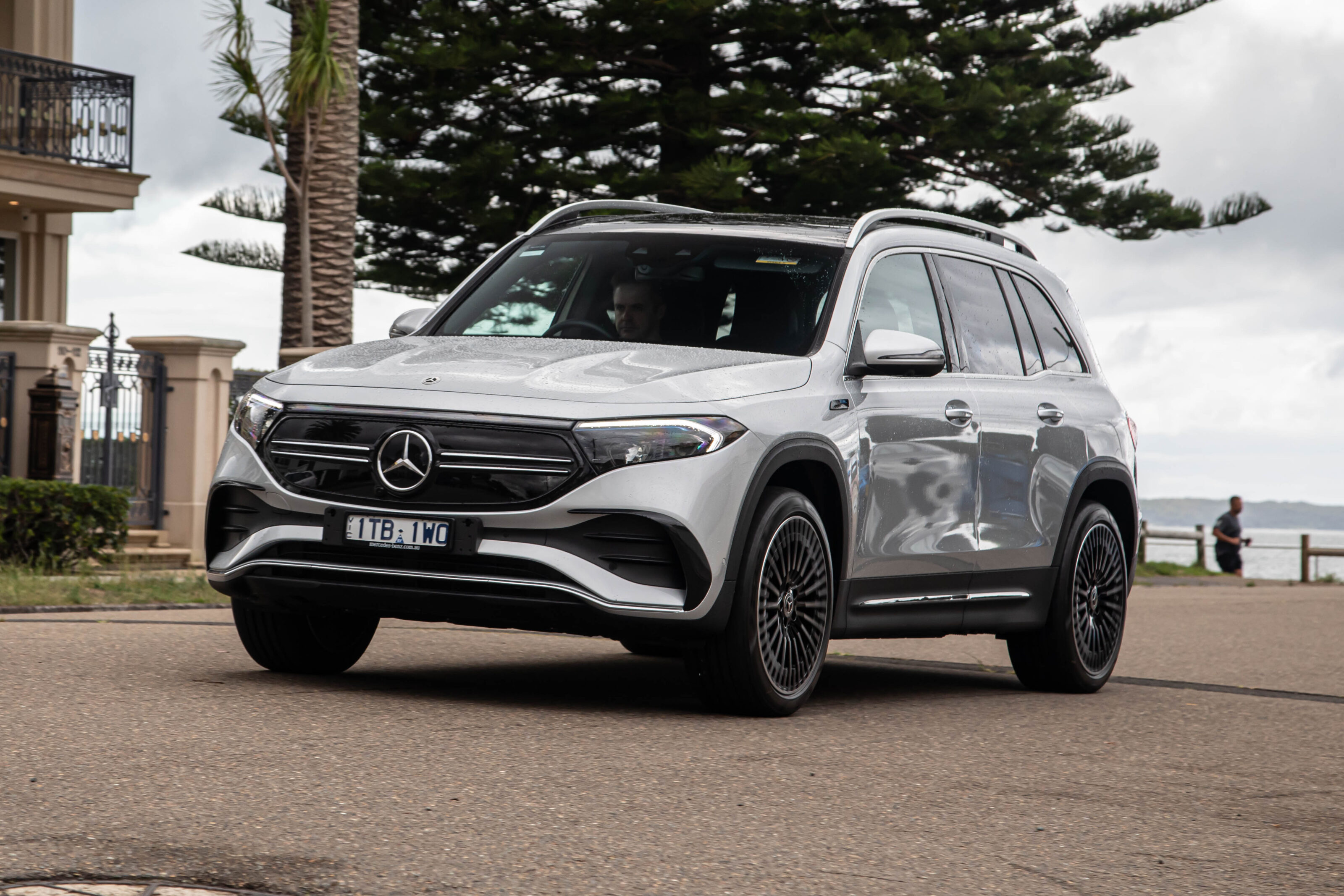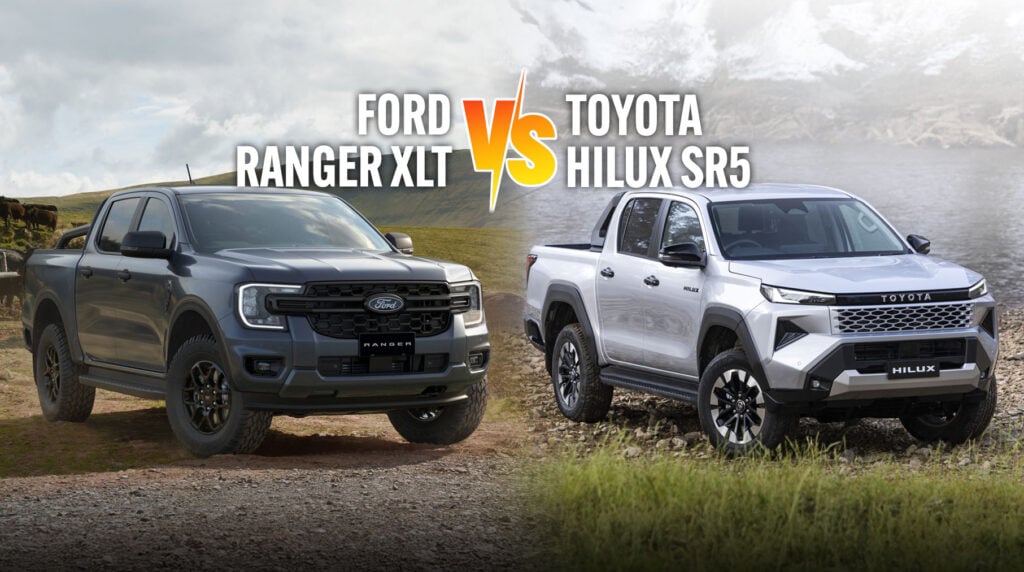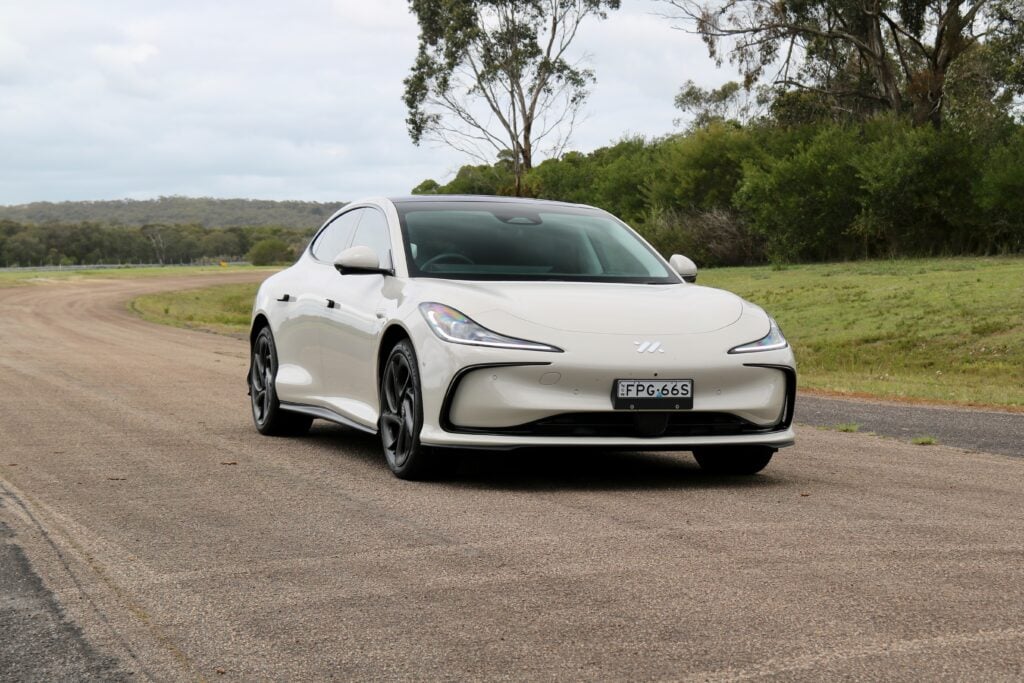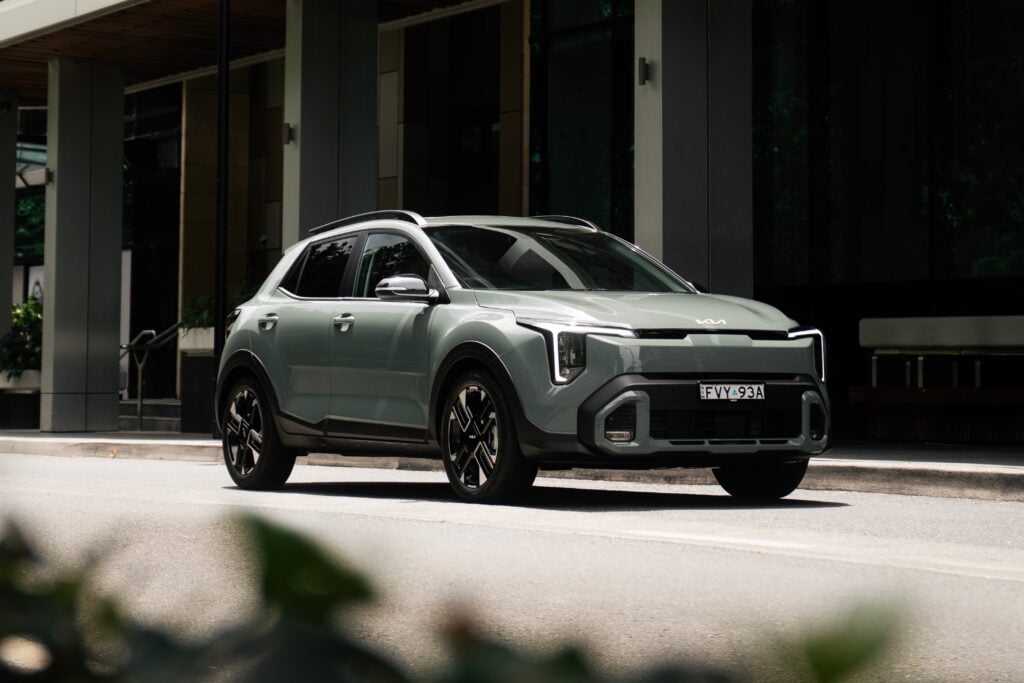Score breakdown
Things we like
- Strong driveline
- Nice interior
- Fun to drive for this kind of car
Not so much
- Manual front seat adjustment
- No spare
- Iffy range for the price
A few years back, Mercedes introduced the GLB.
The looks were definitely a form-following-function thing because, into this reasonably small footprint, the engineers had crammed seven seats.
The third row wasn’t hugely usable, but sufficient for the rare time people needed it.
Switching out the internal combustion engine for an electric motor and a battery gave us the EQB250. Once again, that was a quirky-looking seven-seater with some changes to the exterior appearance to tell you it was electric. The changes are good, the most obvious one being full-width LED lighting front and rear for that night-time UFO effect.
Adding a second motor at the rear resulted in this EQB350, but it also meant chucking the third row out in favour of extra propulsion.
And a bigger price tag to go with all the extra AMG bling.
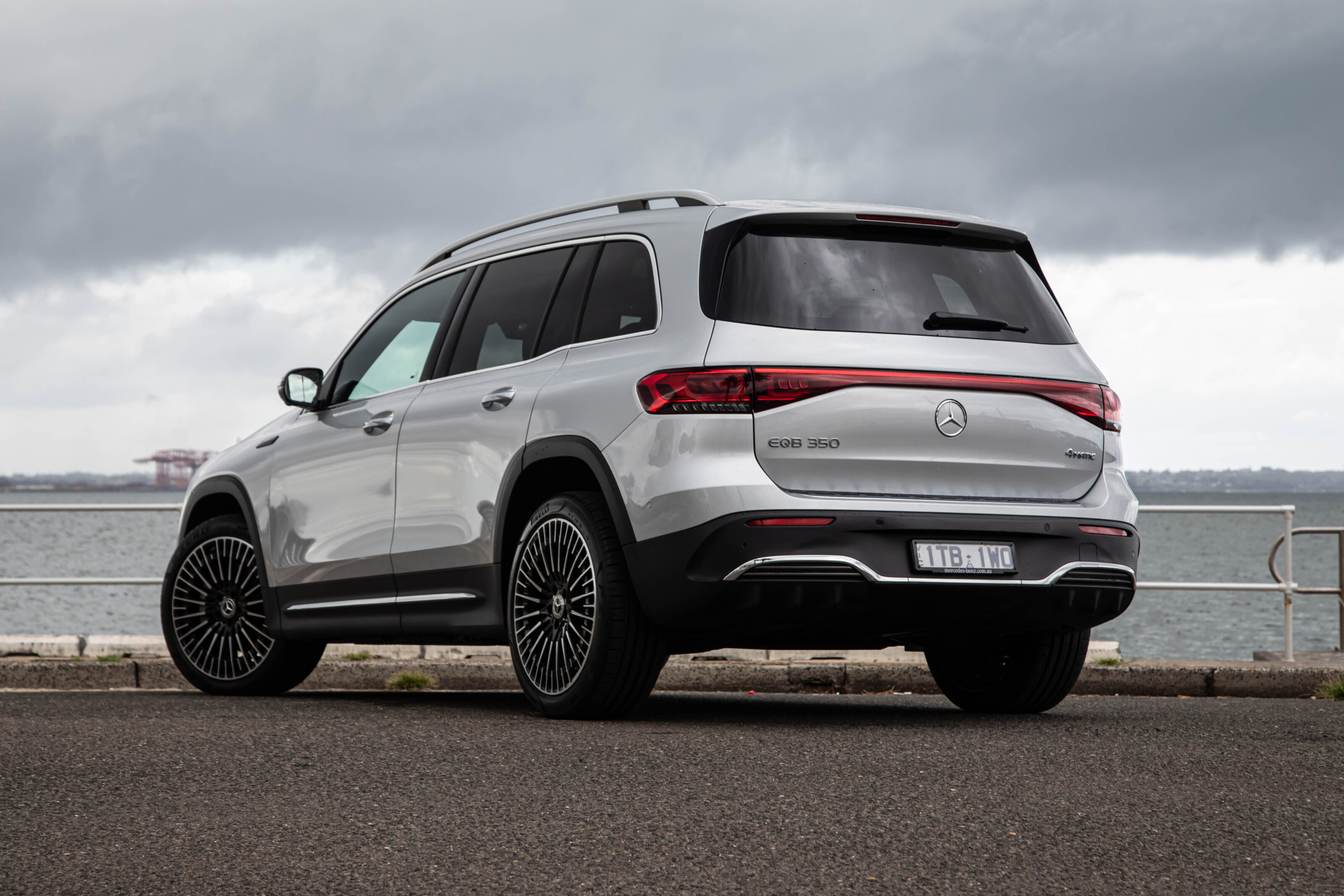
JUMP AHEAD
- How much is it, and what do you get?
- How do rivals compare on value?
- Interior comfort, space and storage
- Battery and charging
- What is it like to drive?
- Range
- How safe is it?
- Warranty and running costs
- VERDICT
- Specifications
How much is it, and what do you get?
The EQB350 tops the two-car range at $106,700 before on-road costs, nearly nineteen-large more than a seven-seat 250.
It’s only about two thousand more than the GLB35 AMG, however. AMG’s version still has seven seats and is quicker than the EV to 100km/h by about a second. Still, that’s not why an EQB buyer is buying the EQB.
Mercedes has not exactly skimped when it comes to standard spec, but as you’ll see, the EQB equipment list has some glaring omissions.
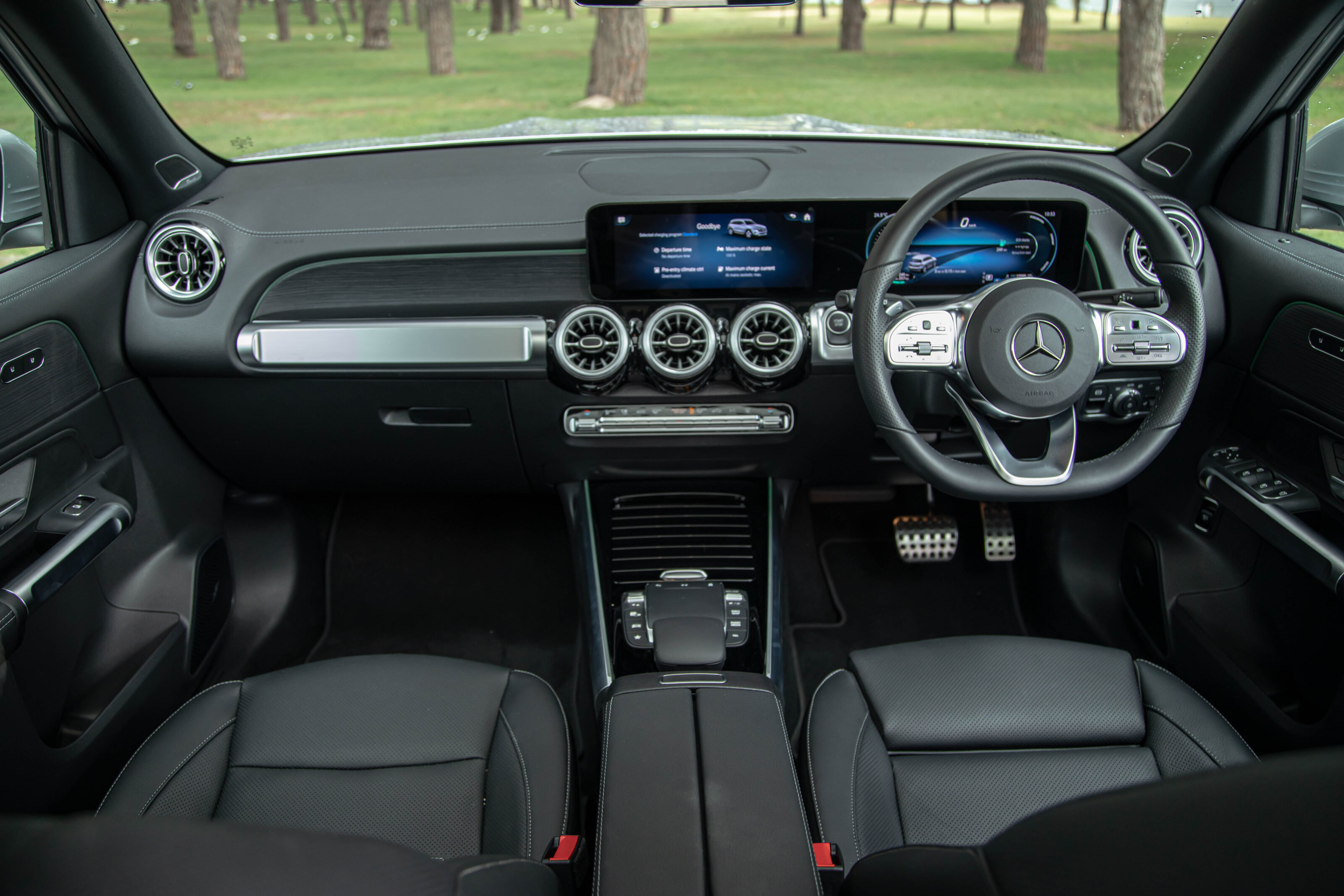
| 2023 Mercedes-Benz EQB350 standard features | |
|---|---|
| 10.25-inch digital instrument cluster | Front and rear parking sensors |
| 10.25-inch MBUX infotainment system | Hands-free power tailgate |
| 20-inch alloy wheels | Heated front seats |
| 360-degree camera system | Keyless entry and start |
| Adaptive high beam | Leather-wrapped steering wheel |
| Adaptive suspension | Low-speed pedestrian alert sound and reversing tone |
| AMG exterior styling | Nappa leather sports steering wheel |
| AMG floor mats | Panoramic glass sunroof |
| Android Auto | Satellite navigation |
| Auto LED headlights | Sports front seats |
| Auto wipers | Suede-like upholstery with red stitching |
| Configurable ambient lighting | Tyre pressure monitoring |
| DAB+ digital radio | Wireless Apple CarPlay |
The front seats might be very comfortable and warm on a cold day with their fancy heating, but you have to move them manually like some kind of animal. When you’re into six figures, I think powered seats are a must, just quietly.
The 10.25-inch MBUX screen is excellent, except Apple CarPlay is constrained into a small rectangle – unlike…um…every other MBUX-equipped Merc I’ve seen.
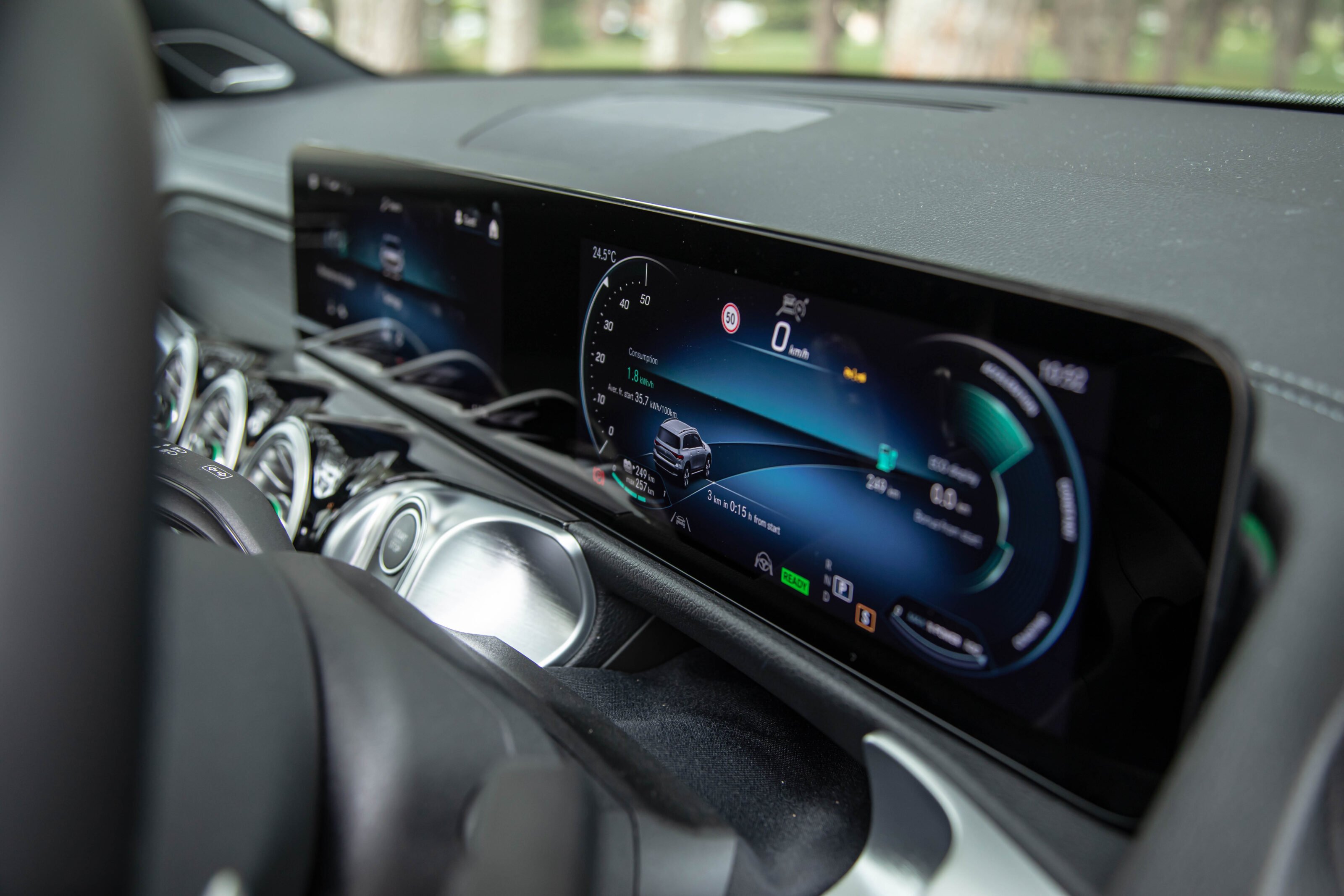
You can tell the EQB and GLB apart by the former’s full-width LED lighting strip at the front, blue badging and full-width LED lighting at the rear. It’s subtle, even when rolling on 20-inch alloys.
There are nine colours, but only two are freebies. The rest are $1490 except for the fancy Magno which is $3300.
My test car had the Urban Guard protection pack ($1300), black leather upholstery ($1700), Burmester-branded surround system ($1400) and “climatised” front seats ($1200). Add to that the paint (Iridium silver) and you’ve got yourself a $114,090 (before on-road costs) five-seater, which is sailing perilously close to larger SUVs from Mercedes itself and its rivals.
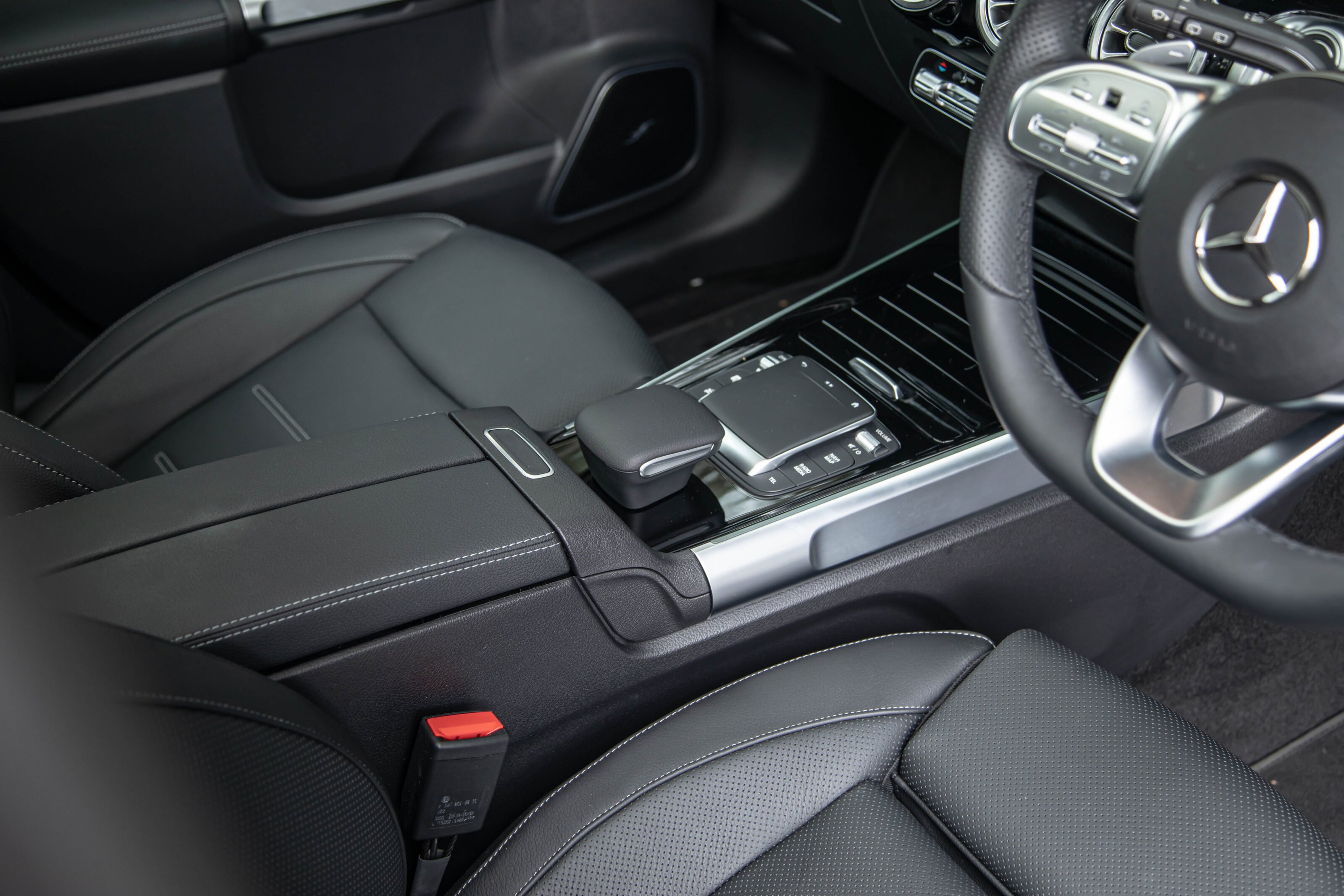
How do rivals compare on value?
Dual-motor EVs are not exactly thin on the ground, even if they’re hard to actually get.
The Tesla Model Y Performance is the least difficult to get your hands on and costs $100,235 before on-road costs when you include the mandatory luxury car tax in the price (which the website doesn’t until you dig into the pricing and I wish they would stop it).
You get two motors, a battery of some description (Tesla doesn’t say but I’m sure the comments will fill with people telling me it’s around 75kWh) providing a WLTP range of 514km and is a pretty swift unit.
The quality isn’t even close to the Merc’s, however, and it’s much noisier. You get easy access to the king of charging infrastructure, however, in the Supercharger network.
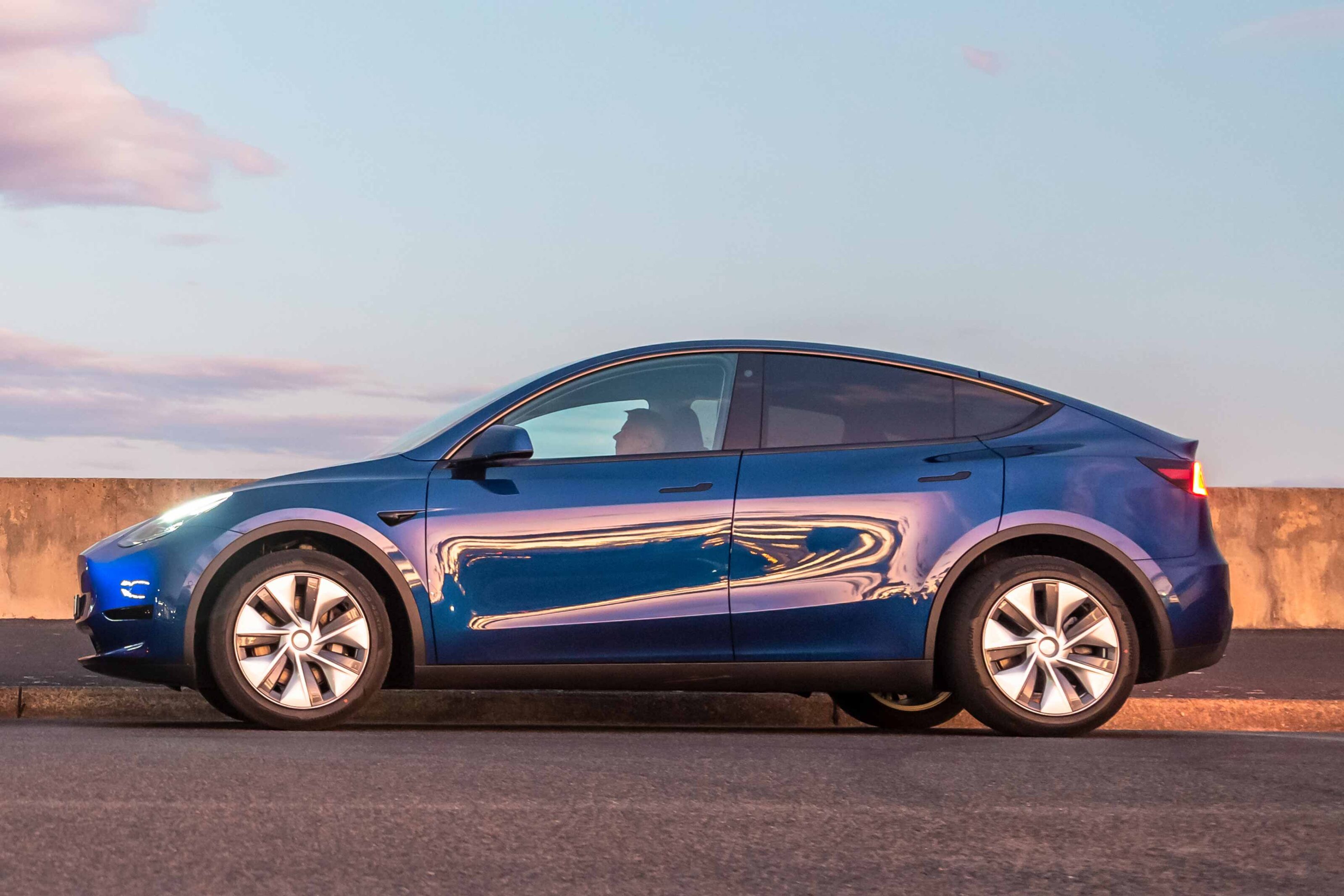
Next up in the twin-motor SUV world is the Volvo C40 Recharge Twin for $83,940 before on-road costs. It’ll charge faster, goes faster and has a longer claimed (420km) and slightly longer real-world range (360-390km) compared to the EQB.
The Volvo is also a fair bit cheaper, even with a few options loaded on. It’s not as roomy inside as the EQB but it’s better looking, or at least I think so.
Hyundai’s Ioniq 5 Techniq starts at $79,500, but a fairer comparison would be the Epiq at $85,000 (both before on-road costs). It’s fully loaded, has a bigger battery, a great interior, incredible styling and easily as roomy if not quite as externally compact as the GLB. It also has a longer range, 350kW charging, and is quicker. Good luck getting your hands on one, though.
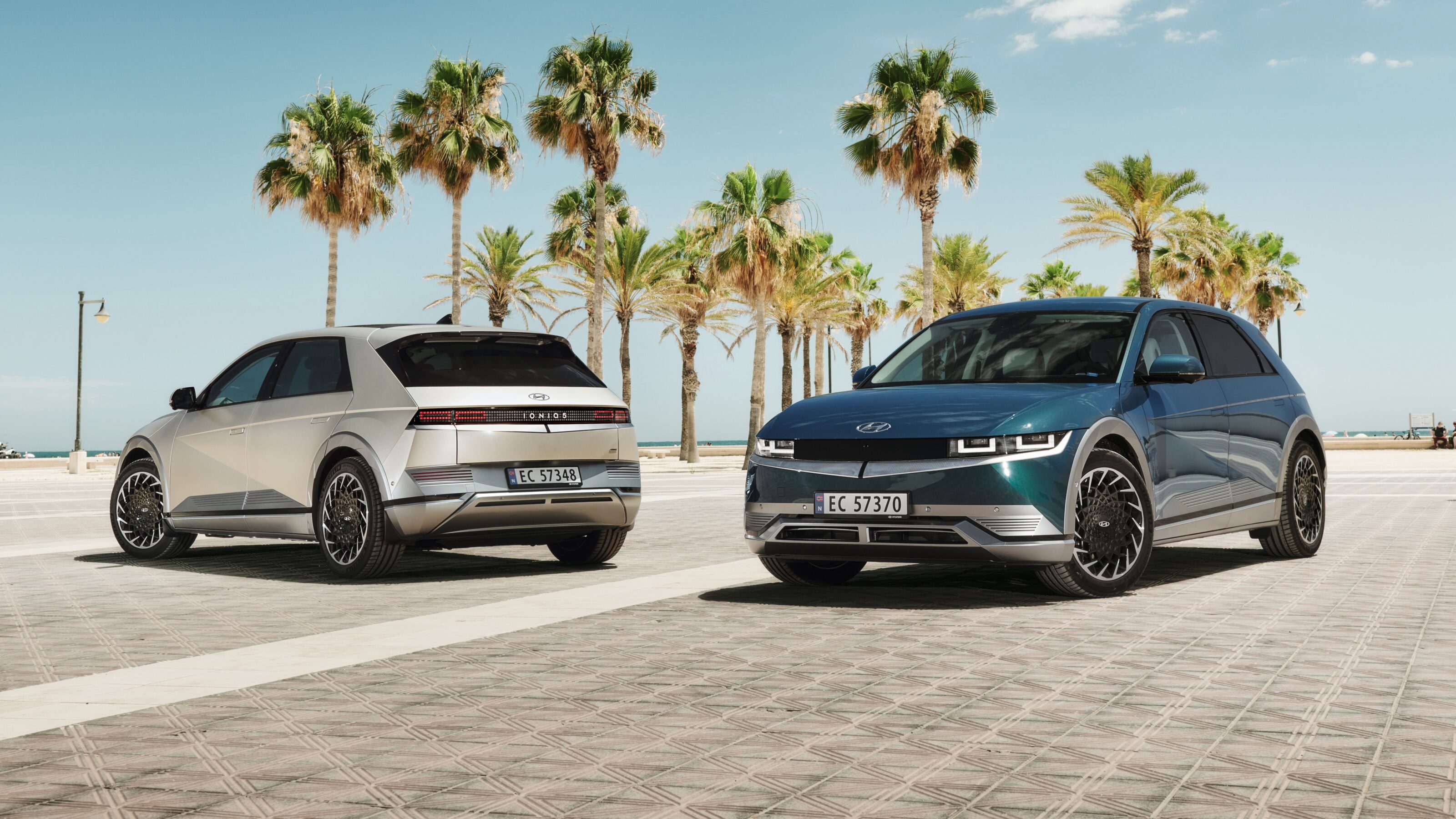
Last year’s Wheels COTY winner, the Kia EV6, now has a GT version starting at $99,590 before on-road costs that will rinse everything on this list in the 0-100km/h race. It has a longer warranty than the GLB, too, and if the reduced range isn’t your thing, you can go to the GT-Line AWD for $87,590 before on-road costs.
The EV6 is another roomy car and, while the interior is a little more prosaic than either the GLB or Ioniq 5, it does the job very nicely indeed.
Stretching the friendship slightly would be to include the Polestar 2 which I reckon rides just high enough to qualify as an SUV.

Interior comfort, space and storage
The bad news on the EQB350 is losing the third row, meaning the GLB’s unique selling point – a seven-seat EV – is lost.
Slinging that extra motor in the back took all the space that two people and their seats did, so they had to go in the name of all-wheel drive performance.
You’re left with the same boot space, however, starting at a very useful 495 litres. With the 40:20:40 split-fold second row stashed, you’ll have 1710 litres, which is also quite a bit. Being a box certainly helps here. The boot floor is quite high but not inconveniently so.
You get a cargo blind, there are a couple of handy little pockets for odds and ends, but no hidden storage beneath the carpet for the same reason as there aren’t any seats.
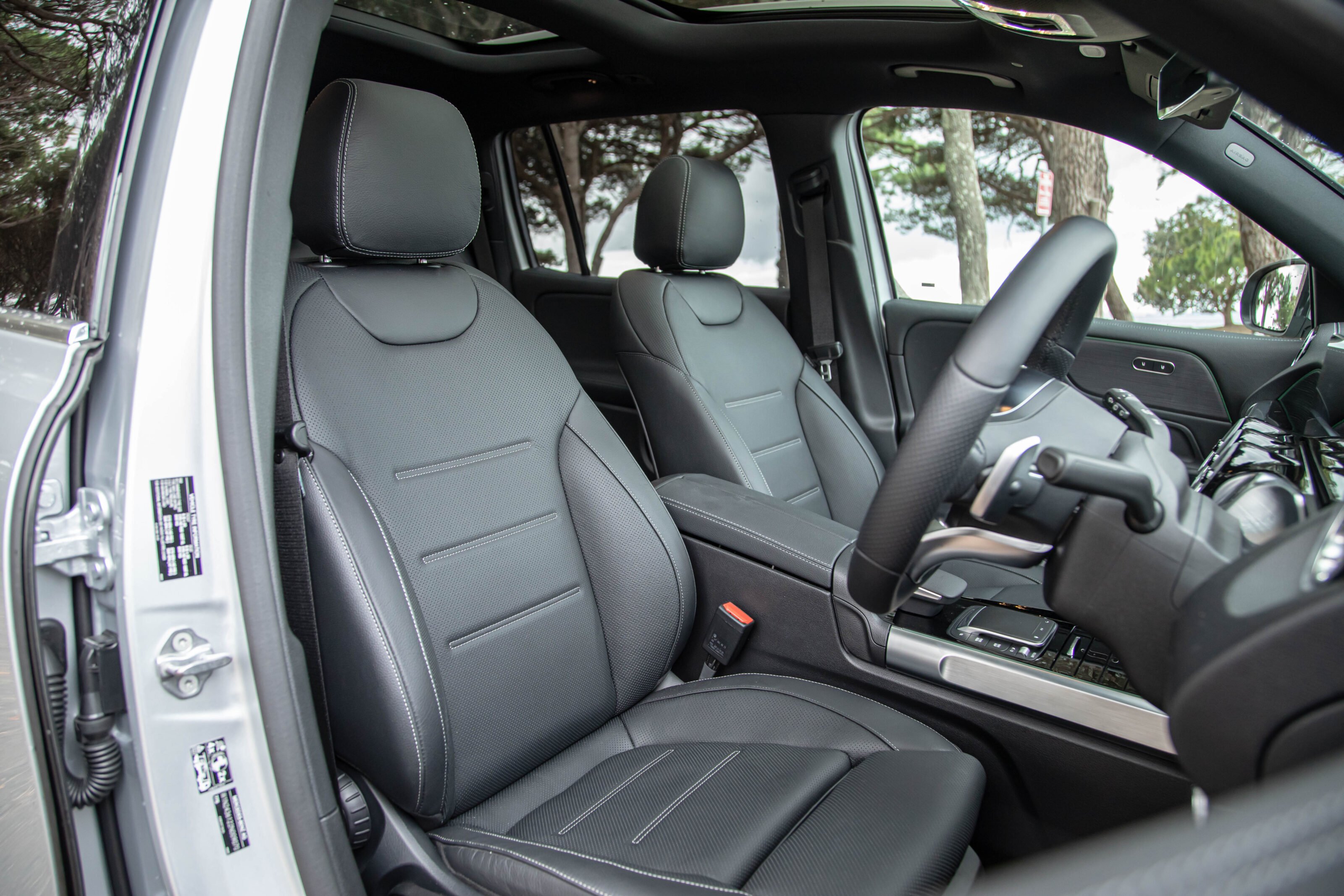
While the back seats are shaped well enough for everything from your backside upwards, the truncated seat squabs don’t offer much under-thigh support, which is a shame.
Also mildly baffling is the deletion of the sliding function of the middle row which may be less of an issue without a third row, but is great for when you’ve got kids in child seats you want/need to reach or pesky anxious dogs.
There’s room here for two tall adults but they’ll get tired without that support on longer trips. Again, a shame, because there is a ton of headroom and the huge windows mean people of all sizes can see out. It feels kind of old-school in the best of ways with all that glass and light.
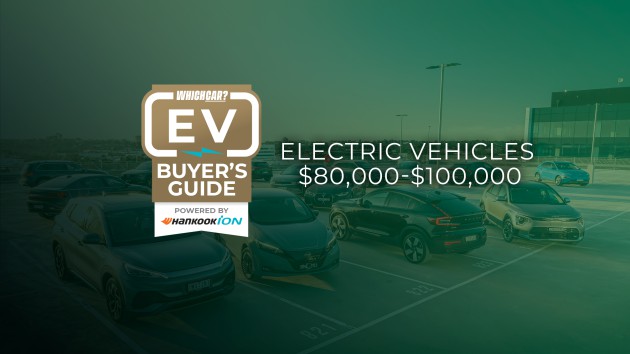
Best Electric Cars, $80k-100k: Luxury EVs tested
This is part three of our price-based EV buying guide, comparing Australia’s electric cars priced between $80,000 and $100,000
Rear passengers get air vents and a solitary USB-C charger, a fold-down centre armrest with a pair of cup holders and bottle holders in the doors.
Moving into the front, you’ll be dazzled by the pair of screens arranged side-by-side and all the various functions, bells, whistles and further accoutrements. MBUX is a good system that continues to evolve and despite my complaint about the Apple CarPlay experience being almost picture-in-picture, it’s really not that bad. The LED lighting in the cabin is configurable and those awesome afterburner-style air vents look great.
The seats look a bit plain but are very comfortable. Manual adjustment is only really a pain when swapping drivers but, at this price point, really?
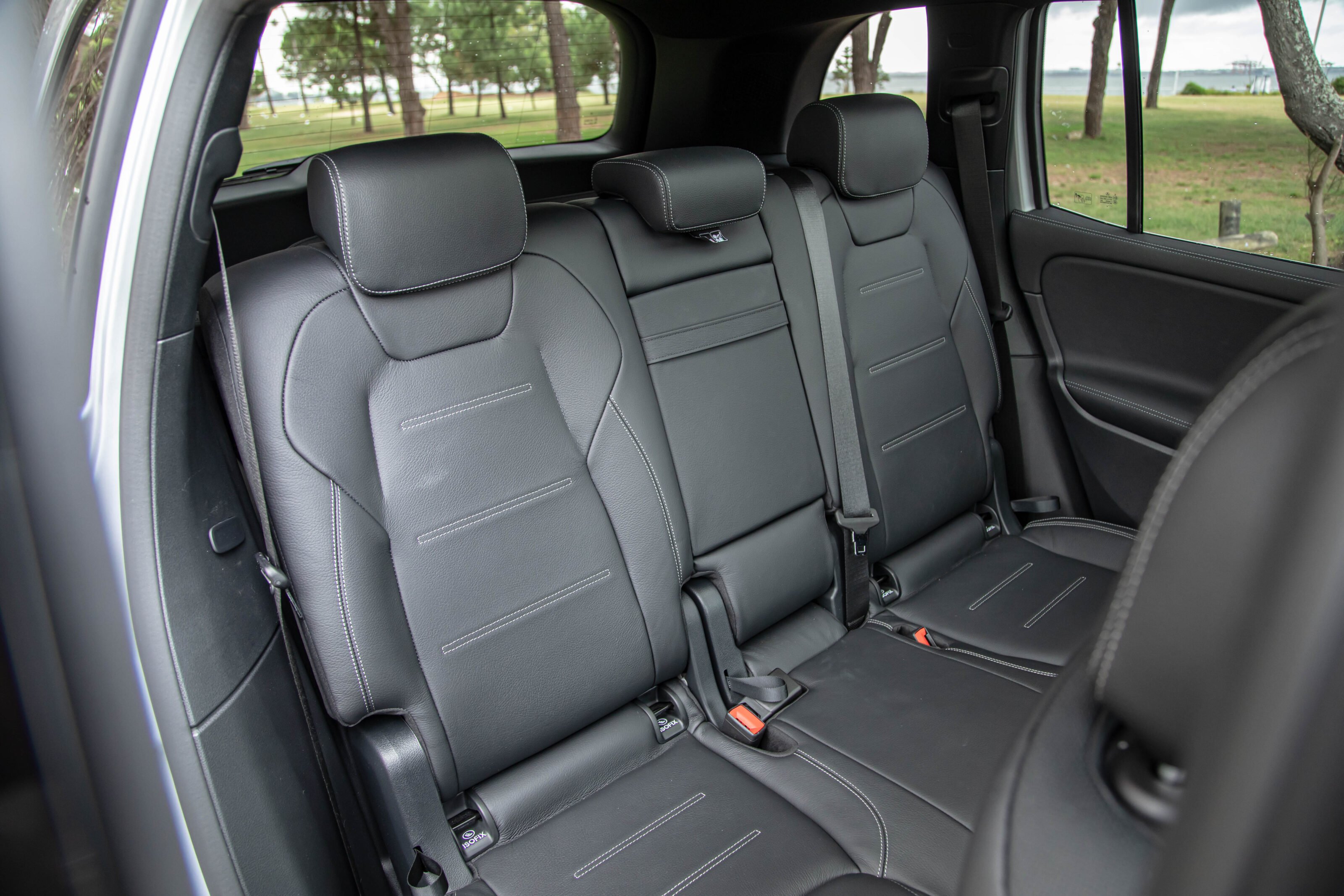
I reckon I’d skip the optional full leather treatment and stick with the fake suede of the standard car, but either way, the hide is quite nice.
There’s a pair of USB-C chargers up front, a wireless phone charging pad, two cup holders and bottle holders in the doors. The adjustable armrest hides a modestly sized storage bin.
It’s a good cabin, spacious and airy but some of the plastics – again – aren’t really a six-figure car proposition.
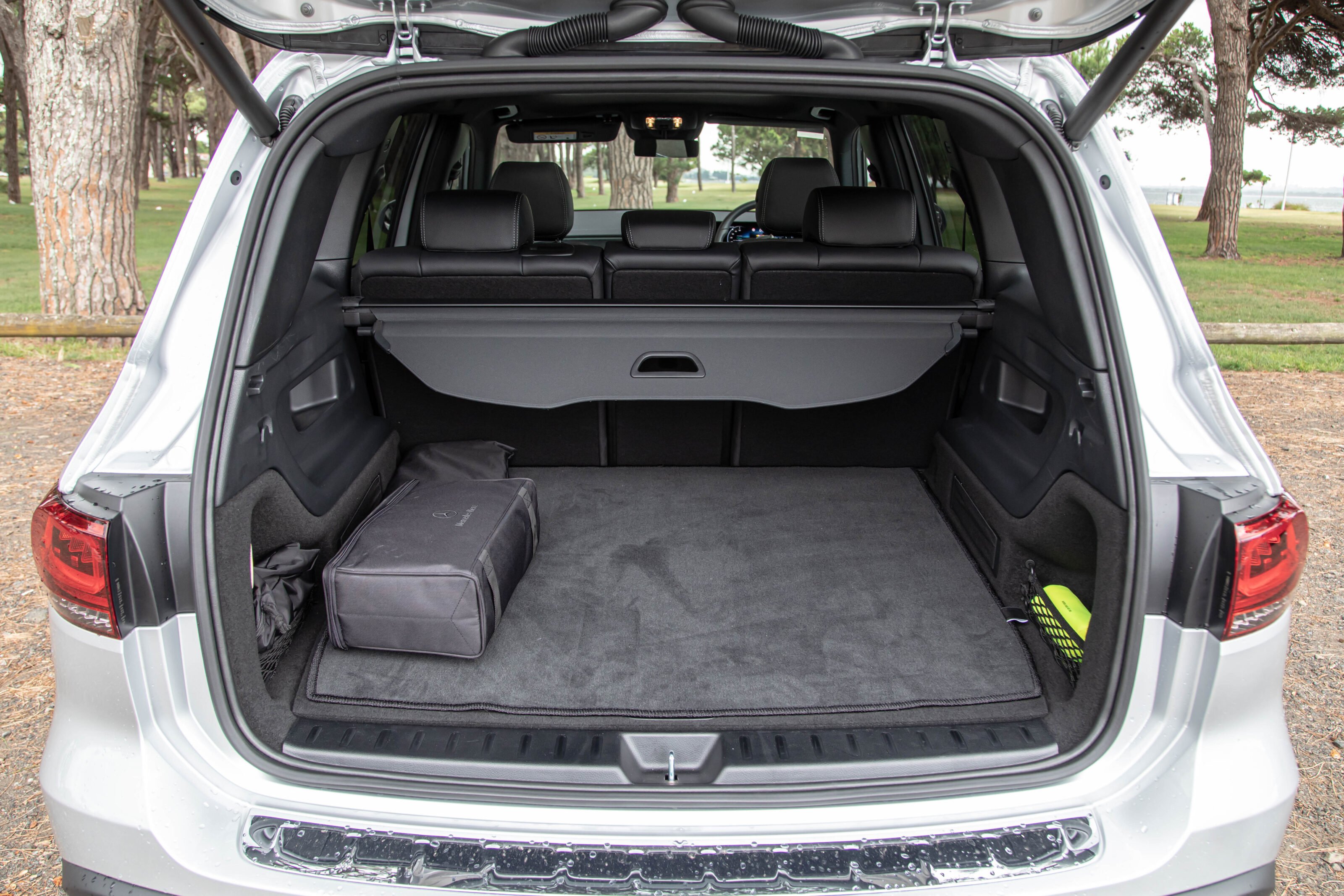
Battery and charging
The EQB250 has the same 66kWh battery as the 250, so with an extra motor to feed, there’s an 11km drop in range to go with it. That’s not a bad result – 371km down to 360km.
| 2023 Mercedes-Benz EQB350 battery details | |
|---|---|
| Battery size | 66.5kWh (usable) |
| Battery type | lithium-ion |
| Charge port | CCS2 (right hand side at the rear) |
| Home charging (11kW max) | 7h15 |
| Fast charging | 100kW, 10-80% in 30 minutes |
| Voltage | 400V |
| WLTP Range | 360km |
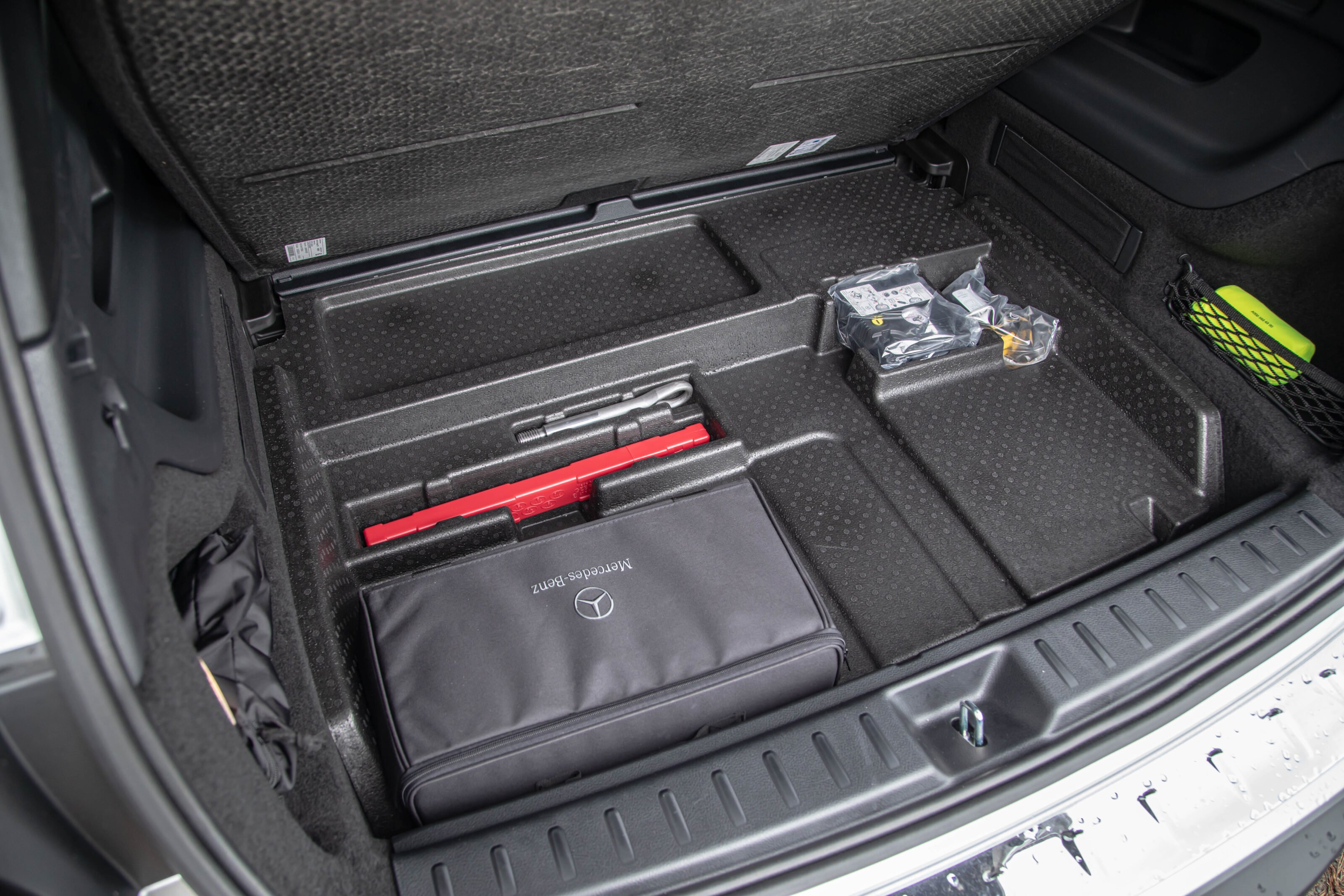
Charging maxes out at 100kW, which is a little on the low side compared to, say, Volvo, Polestar, Kia or Hyundai. But the reality is that few charging stations will deliver that kind of juice anyway, no matter what the sticker says. Most Tesla stations are about 120kW which, as I say, is fine and it’s a rarity to find anything with more oomph actually working.
So at this point, it’s largely academic. Cue the howling from EV fans that I’m being unfair. I’m here to tell you I’m an EV fan too and it’s profoundly irritating that this is the case. I felt like a right dunce having sought out a working 350kW charger with an 800V Kia and only getting 50kW out of it.
At full tilt, the EQB350 will charge from 10-80 per cent in 30 minutes, which is pretty good going really. Under-ten and over-eighty slows considerably, as it does with most lithium-ion batteries (a software-driven battery protection strategy).
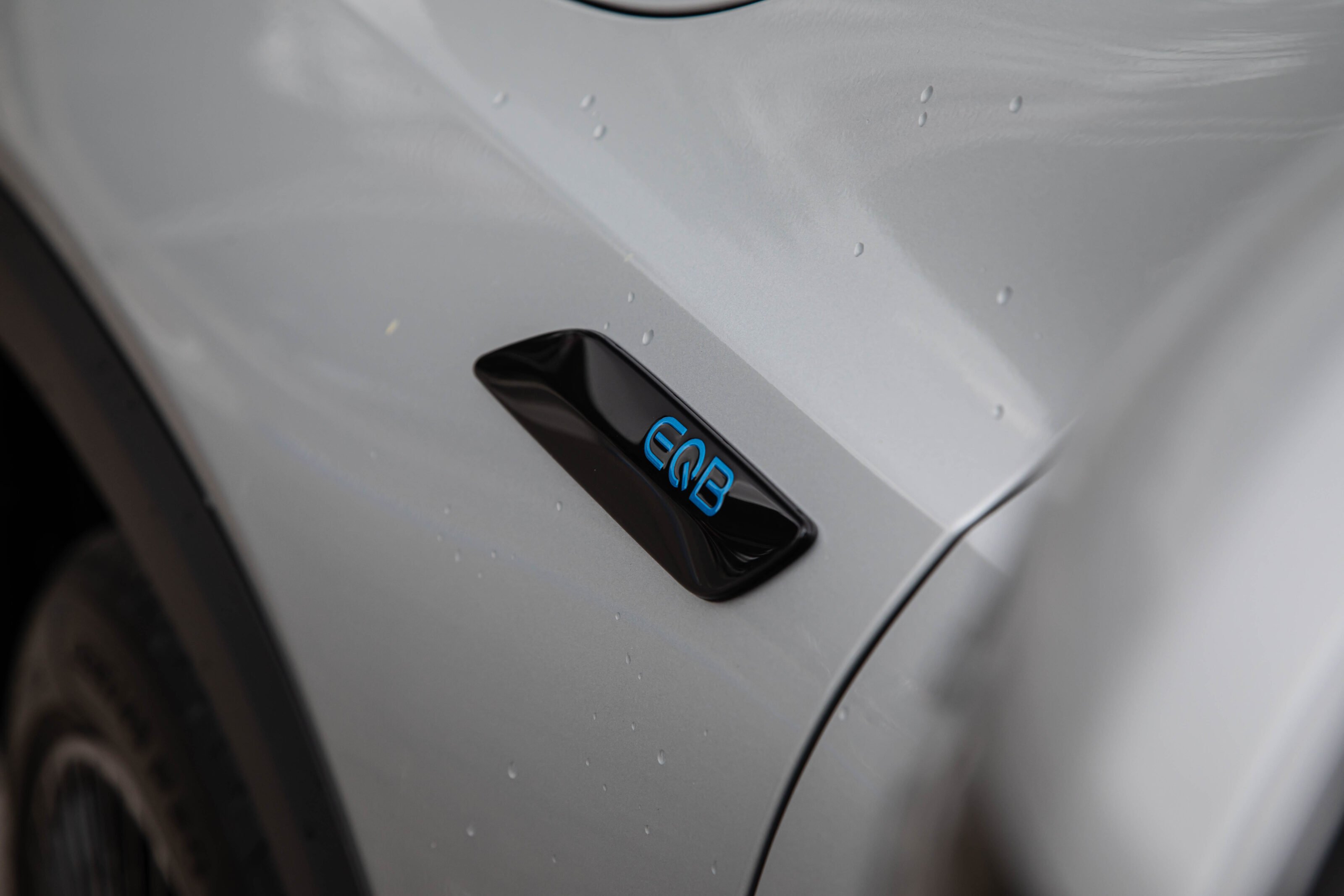
The LFP battery in a lower-spec Model Y, for instance, will charge to full without the same magnitude of slowdown.
Charging at home with a three-phase 11kW wallbox will give you a full charge in just over seven hours, so if you have access to one it is not a bad way to go. You can configure when it charges to get the best out of your power tariff if you have time-of-use power or you prefer to run it off rooftop solar if you have it.
Without a wallbox, you’ll be looking at anywhere from 12 to 15 hours, give or take, but if you remember to plug it in every night (should you have that luxury), you’ll never be waiting around unless you’ve done a long trip.
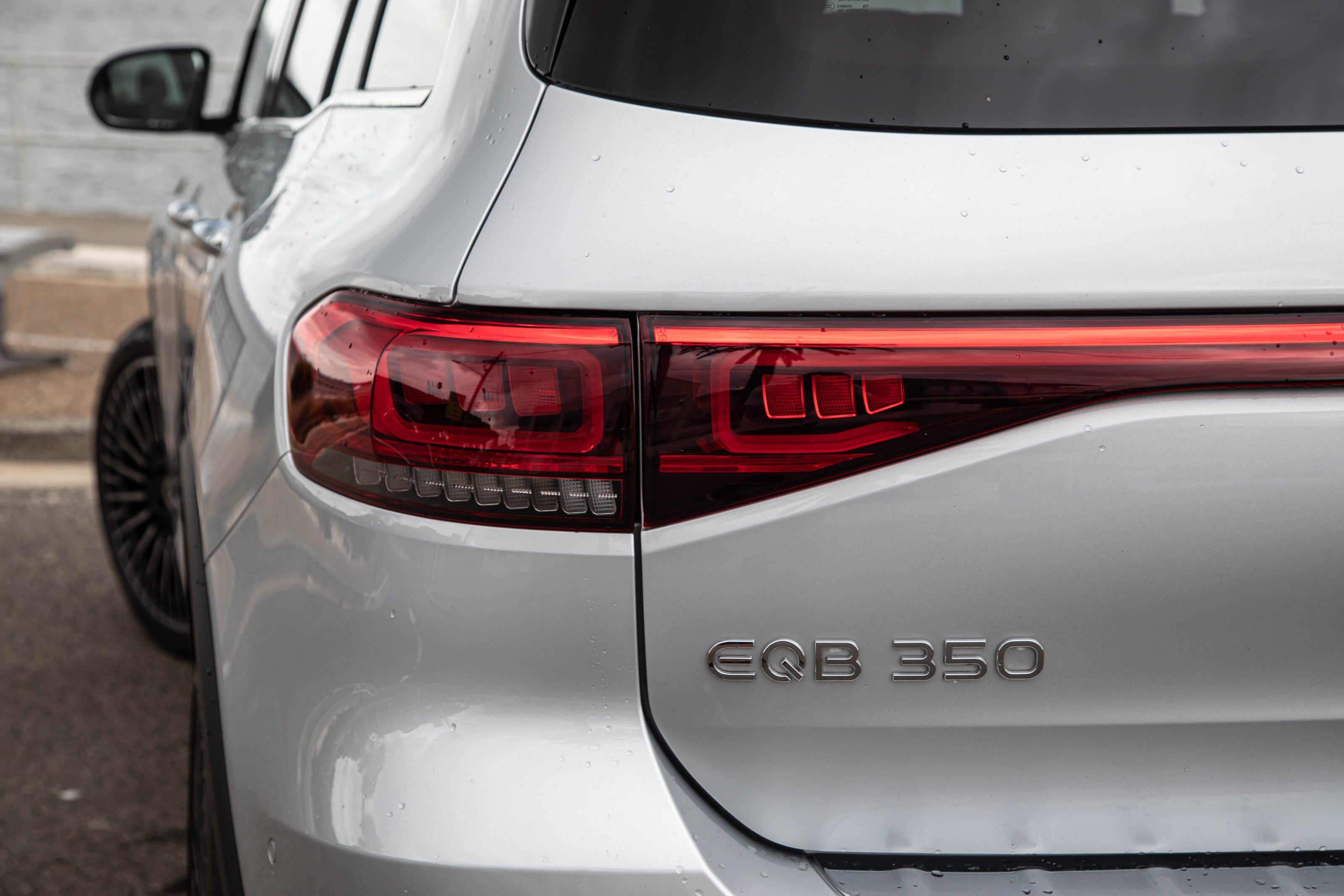
What is it like to drive?
I can’t speak for the single motor 250 so everything I tell you here is in the context that I’ve only driven the quick-brick dual motor. And boy howdy is it quick.
I reckon the 6.3-second claimed 0-100km/h time is a touch conservative, perhaps to save the blushes of the petrol AMG version.
| 2023 Mercedes-Benz EQB350 drivetrain | |
|---|---|
| Motor | front and rear |
| Gearbox | single-speed reduction gear |
| Total power | 215kW |
| Total torque | 520Nm |
| 0-100km/h | 6.3 seconds (claimed) |
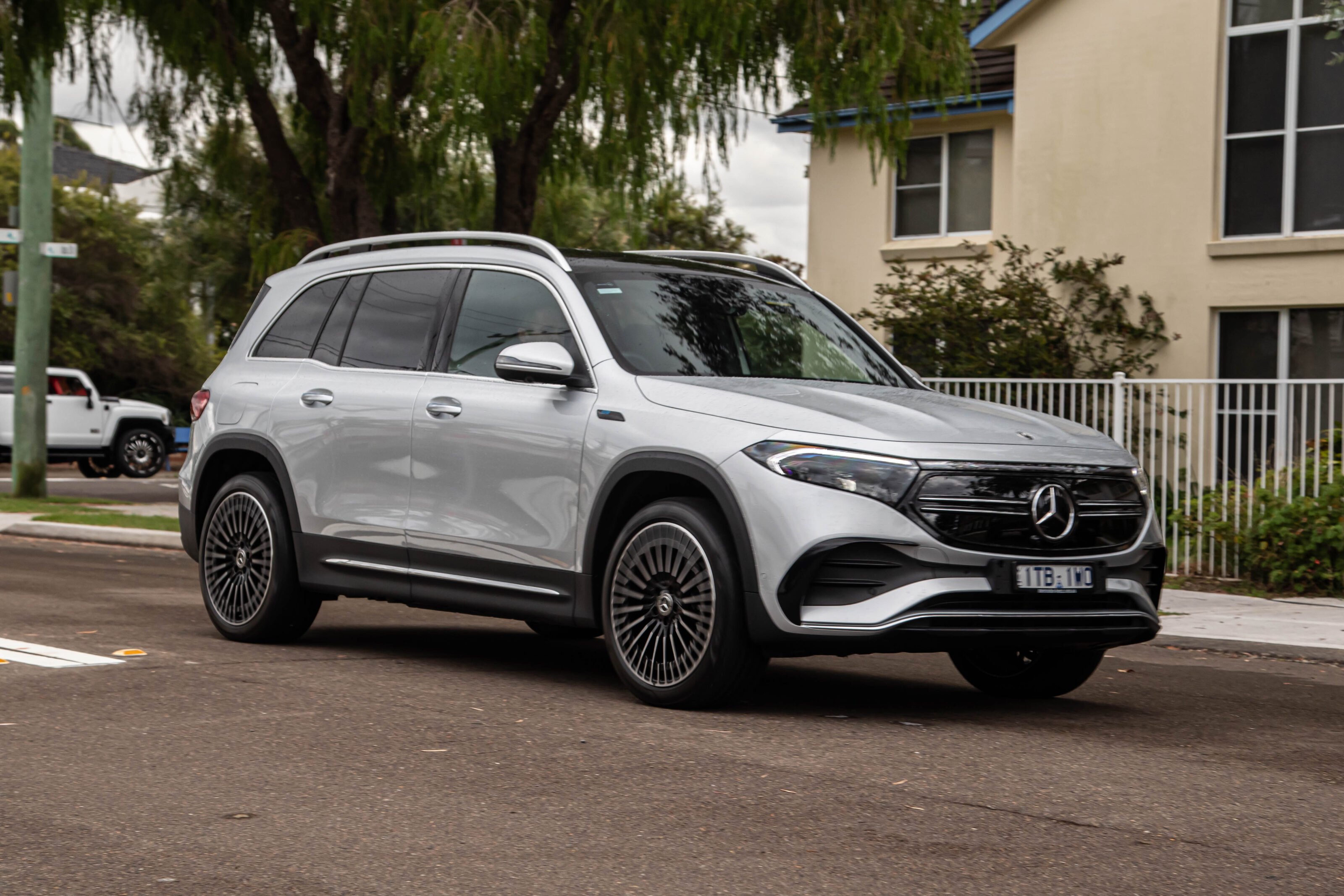
With the addition of that extra motor, power jumps 75kW to 215kW and torque is up from 385Nm to 520Nm. That’s the kind of twist you expect from a strong diesel, which is welcome because the EQB350 is no lightweight at almost 2200kg before you load up.
The extra motor goes at the rear, so you’ve got a nice spread of power between the front and rear axles, reducing the likelihood of unruly behaviour from the front tyres. It still feels quite front-driven – especially in Comfort and Eco modes – but the well-judged steering helps mask that impression.
In normal city driving it’s very effective, with not much throttle needed to break clear of the pack or take the gaps when they come. There’s a roll-in of torque rather than the neck-snapping vibe a lot of people associate with powerful EVs, so it’s smooth but quick.
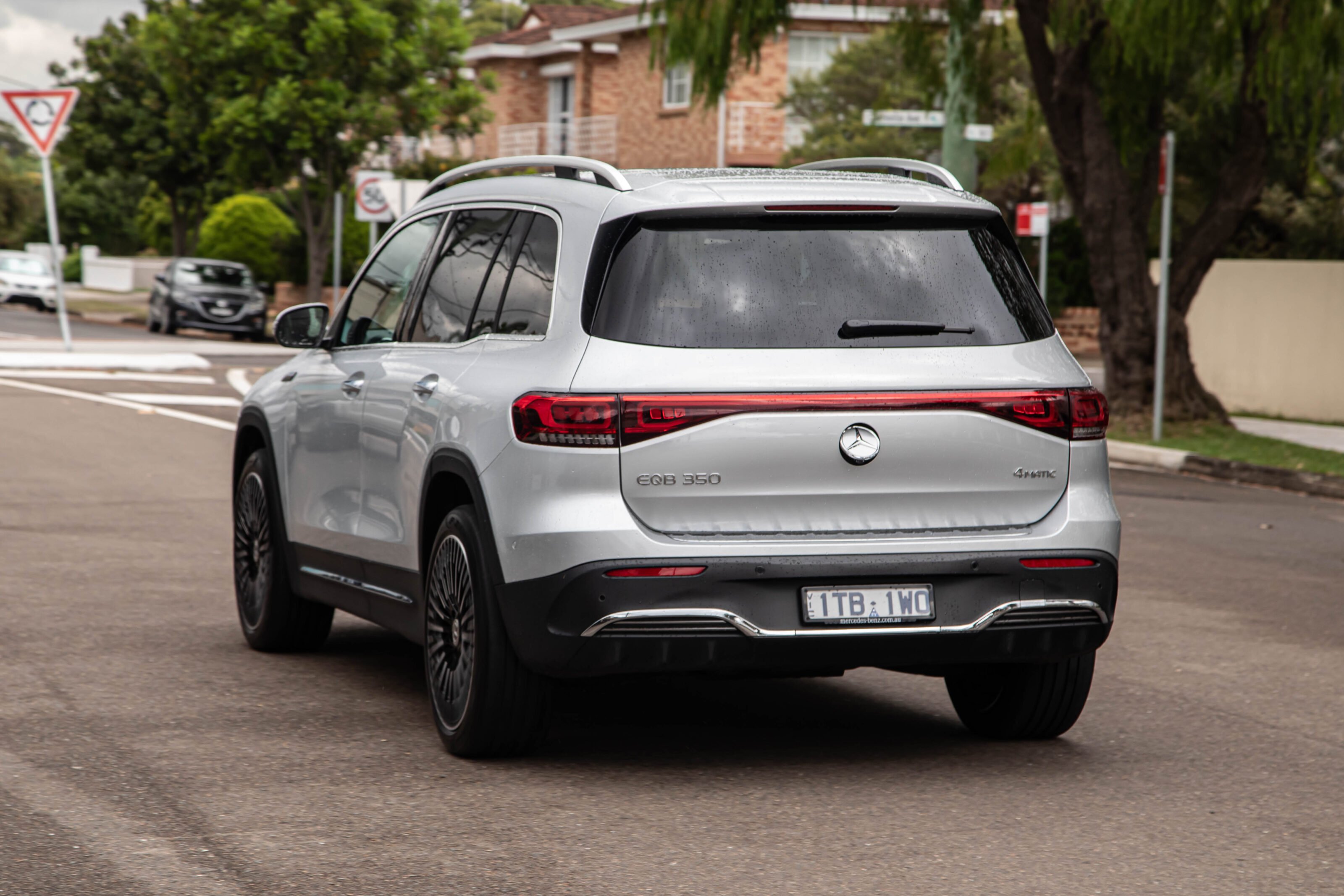
With sportier modes engaged, the modest body roll is better contained but the ride quality doesn’t deteriorate, which is quite a trick on 20-inch wheels. You wouldn’t call ever call it delightfully cushy – there’s always a sporting edge to the ride – but it’s taut and controlled as you amp (see what I did there?) things up.
And again, given its upright stance and tall glasshouse, you’ve got a ton of vision, aided and abetted by the various cameras and sensors.
The forward auto emergency braking (AEB) is a bit of a nanny, though. I pulled out of the left lane to get around a slow-moving car and it “saw” another car in the right lane and gave us a jolt on the brakes and a tug of the seatbelt pre-tensioners.
It is nice to know those systems are there, but also, ouch. The other car was a fair way off and moving away at quite a clip, so I’m not entirely sure which of the two vehicles the system was worried about.
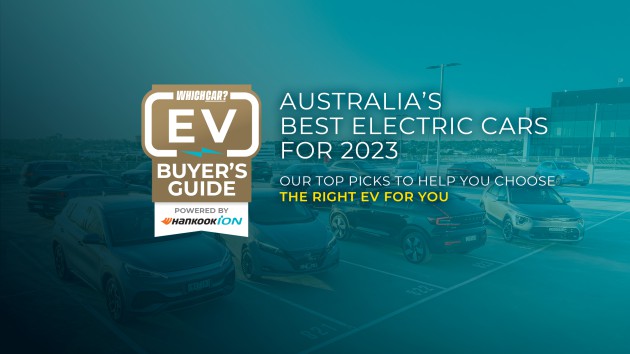
Australia’s best electric cars for 2023
We’ve tested nearly every EV below six figures in Australia to rank the best on sale today
Range
Coming in at 350km on the WLTP test cycle is a fairly reasonable result for a car that isn’t optimised as EV-only. Pulling that number apart, the WLTP range suggests a consumption rate of just under 19kWh/100km.
| 2023 Mercedes-Benz EQB350 efficiency | |
|---|---|
| WLTP range | 350km |
| WLTP consumption | 18.8kWh/100km |
| Indicated consumption | 20.7kWh/100km |
| Real-world range | ~335km |
My week with the EQB350 saw an average of 20.7kWh/100km, which is close to the claimed usage and translates to a real-world range of around 335km.
Range is dependent on weather conditions and this was bombing around the suburbs along with some 80km/h and 110km/h running in Sydney’s very sticky early February weather.
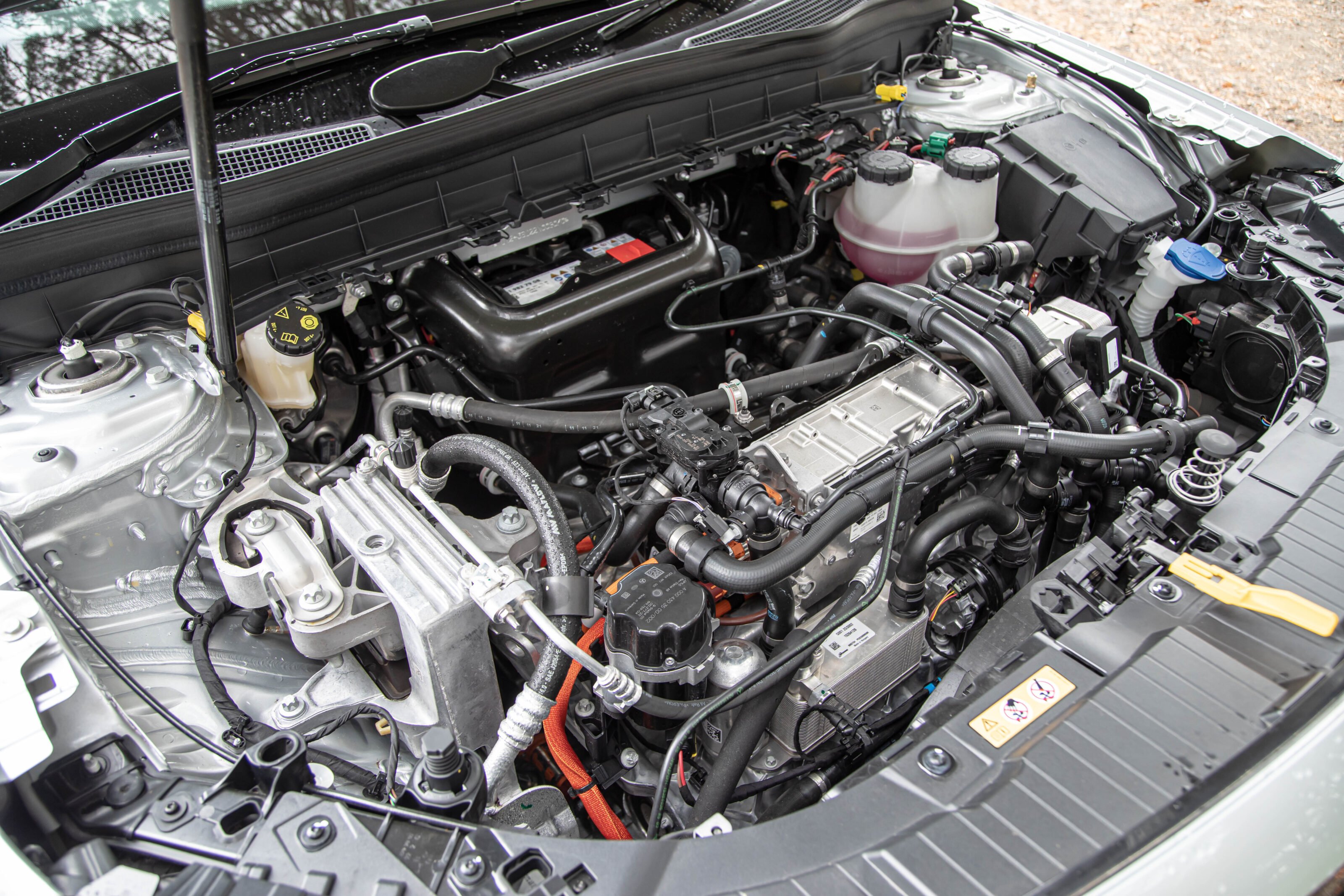
How safe is it?
The EQB is, as you might imagine, packed with safety gear. Its five-star safety rating is based on the GLB’s result, with ANCAP conducting unspecified “further tests” on the EQB250.
For yet more unspecified reasons, the five-star rating applies only to the 250. I don’t know about you, but I find ANCAP baffling more often than I think it should be.
Kids are looked after with two lots of ISOFIX points and three top-tether anchors.
The forward AEB features pedestrian and cyclist detection and works at high and low speeds.
| 2023 Mercedes-Benz EQB350 safety | |
|---|---|
| 360-degree cameras | Lane departure warning |
| 9 airbags | Lane-keep assist |
| Adaptive cruise control | Rear cross-traffic alert |
| Anti-lock brakes | Reverse AEB |
| Blind-spot monitoring | Reversing camera |
| Forward auto emergency braking | Side exit warning |
| Forward collision warning | Stability and traction controls |
Warranty and running costs
The EQB is covered by Benz’s five-year, unlimited-kilometre warranty. The battery has an unusually generous 10-year / 250,000km warranty to guard against “drastic” degradation.
Servicing is required every 12 months or 25,000km, but it’s not cheap. A three-year plan costs $1650, four years $2250 and five years of servicing will set you back $2650. It’s substantially cheaper to service than a petrol EQB but some rivals offer free servicing periods or just plain cheaper servicing.
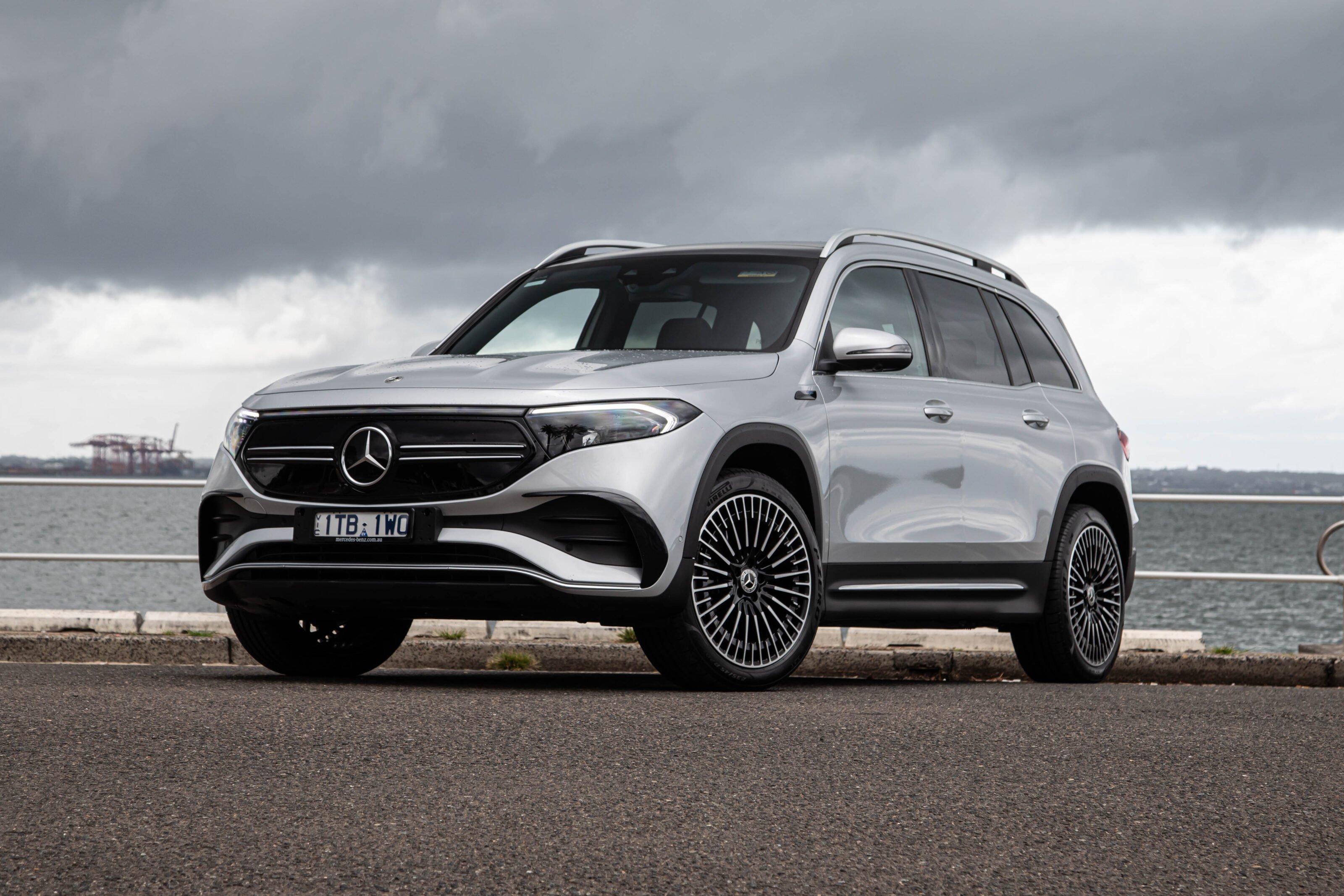
VERDICT
We had a rare week of furious agreement in the house about the EB350.
Both my wife and I thought it was a bit awkward-looking, some of the plastics a bit ho-hum, and the back seat could be better.
We also agreed on how nice it was to drive, how easy to use and that it was a low-fuss, swift EV. We just wished it didn’t cost so much for the 350 and that without the seven seats, it kind of rendered the concept a little pointless.
Then again, variety is the spice of life and if you need a practical, city-friendly raised wagon – which sounds like I’m damning it with niche praise, and I’m not – the EQB350 is very, very good.
| 2023 Mercedes-Benz EQB350 specifications | |
|---|---|
| Body | 5-door, 5-seat medium SUV |
| Drive | all-wheel |
| Engine | dual electric motors |
| Transmission | single-speed reduction gear |
| Power | 215kW |
| Torque | 520Nm |
| 0-100km/h | 6.3 sec (claimed) |
| Energy consumption | 19.0kWh/100km (combined) |
| Weight | 2163kg |
| Suspension (front) | MacPherson struts, coil springs, adaptive dampers, anti-roll bar |
| Suspension (rear) | Multi-links, coil springs, adaptive dampers, anti-roll bar rear |
| L/W/H | 4684mm/1834mm/1701mm |
| Wheelbase | 2929mm |
| Brakes | discs front and rear, regenerative braking |
| Tyres | 235/45 R20 Pirelli P Zero |
| Wheels | 20-inch alloy (no spare) |
| Price | $106,490 + on-road costs |
Score breakdown
Things we like
- Strong driveline
- Nice interior
- Fun to drive for this kind of car
Not so much
- Manual front seat adjustment
- No spare
- Iffy range for the price
We recommend
-
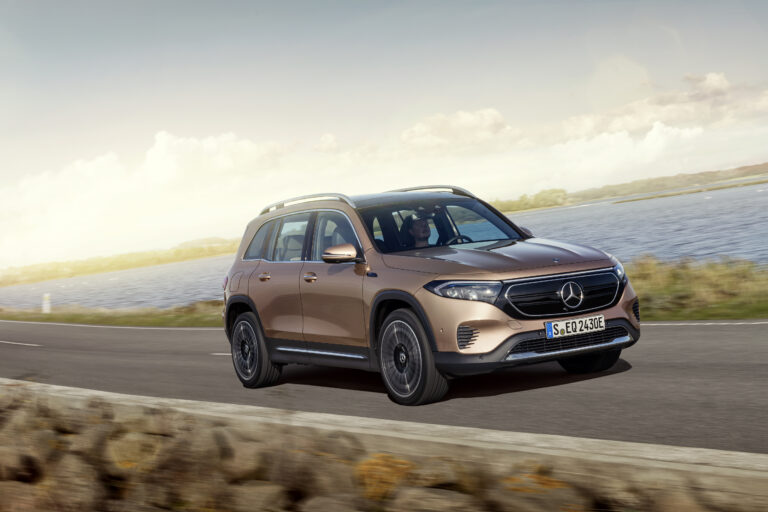 News
News2023 Mercedes-Benz EQB pricing and features for Australia
Mercedes-Benz has confirmed local details for the EQB, providing a more-affordable electric seven-seat option
-
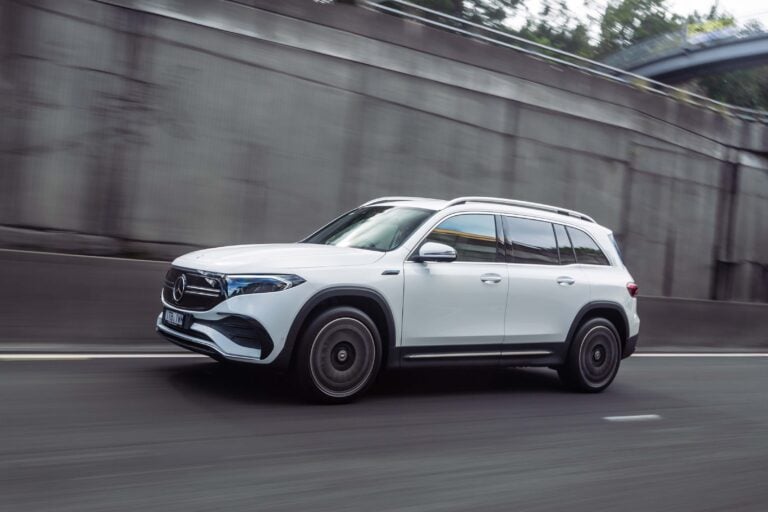 Reviews
Reviews2023 Mercedes-Benz EQB review: Australian launch
The best (and only) electric seven-seater you can buy right now? You're looking at it.
-
 News
NewsNew car calendar 2026: All the new cars coming to Australia next year
Here’s the WhichCar by Wheels guide to all the new cars that will launch in Australia in 2026. Check back in regularly for updates...


